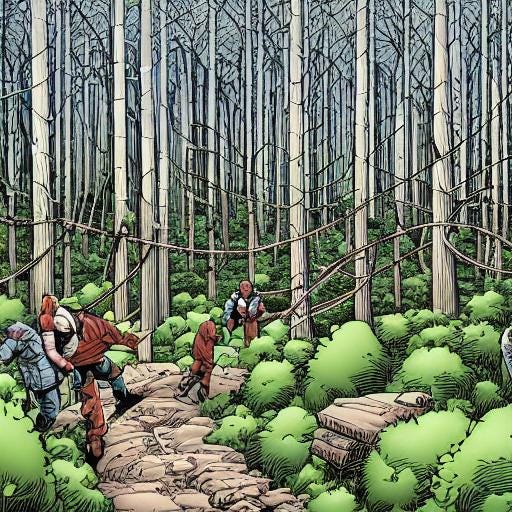Intro
Ghosha means cowherd. Ghoshayatra Parva is the story of the Kauravas going to the stock show near Lake Dvaitavana.
The ‘As It Rhymes’ chapters in Ghosha parva are available in this link.
As It Rhymes
1.
Yudhishthira said,
‘How can you be so cruel, Bhima?
These warriors yeet their weapons in defeat.
Is it possible to imagine how much luck it took to make these lions yield the battlefield?’
2.
O’ Vrikodara! There are differences in any community - uncles slap fight at every family barbecue.
But I thought you would be pleased to make a daring rescue.
3.
Blood is thicker than wine.
We must intervene save our kin from these swine.
4.
I see Duryodhana’s whole hog plan now.
He meant to set up fancy tents and milk us for kicks like a lolcow.
5.
Duryodhana may be many things, but the Gandharvas have him now under lock and key.
Our warrior family dynasty will be a laughing-stock if Gandhari’s first baby’s not gotten back by me.
6.
We must save our protector!
Grab bow and arrow!
Never surrender!
Remove the Kuru sorrow!
7.
Victory to Arjuna who always wins!
Victory to the Ashvins’ Death Twins!
Unleash these three tigers among men to save Suyodhana’s rash skin.
8.
Assemble a chariot tiger team.
Load the wagons with every weapon in the arsenal.
Pack the cars with gold and gems that gleam.
9.
To the gamebred, mount up - get ahead.
Ride your chariot wheels so they make violent squeals.
10.
Let these melodics hear the comeuppance cometh.
When the musicians took Suyodhana prisoner, it became personal.
11.
There is a rich reward for whoever saves Dhritarashtra’s hides.
Vrikodara, the strongest of the strong, has your backsides.
12.
We will ambush the musical miscreants.
They won’t get away with their lyrical insouciance.
13.
Granting boons.
Sitting on thrones.
Having sons.
Freeing an enemy brings delight greater than any of these three.
14.
Let Suyodhana’s disappearance drive your mighty armed intolerance.
15.
Cheers to Vrikodara leading the way!
Cheers to victory today!
16.
Let the Sama Veda be your guiding light.
Bhima free Suyodhana in the fight.
17.
See we come in singing the Sama Veda soft and silent like cotton wool.
Use flattery to free the rotten fool.
18.
If soft power doesn’t take it down.
Bhima you are free to release the hound.
19.
Vrikodara, after we do these deeds we won’t have to sleep on a bed of reeds on the ground.’
20.
Vaishampayana said,
‘After Arjuna hung every word Ajatashatru said in his head.
Kaurava vowed to make the words of the guru true.’
21.
Arjuna said,
If singing the Sama Veda verse by verse does not win the Gandharvas hearts and minds.
If they do not release Dhritarashtra’s sons after hearing me sing then I swear I will show these belligerent musicians my fighting worth.
The blood of Chitrasena will flood the earth.’
22.
With Arjuna wearing his heart on his sleeve, Duryodhana’s sycophants felt relieved.
Surely mighty Partha would release the aggrieved.
Notes
[2] Vrikodara is Bhima. Vrikodara means wolf belly.
[7] The Ashvins are Nakula and Sahadeva. They are often referred to as the two Yamas, or two deaths.
Suyodhana is another name for Duryodhana
[20] Vaishampayana ibid.
[21]
Chitrasena is the leader of the Gandharvas.
Sama Veda is an old collection of verses telling old gods stories. The Rig Veda, Yajurveda and Atharveda. The Vedas are the oldest Hindu scriptures. They were to the characters in the Mahabharata as the Old Testament stories were to the New Testament characters. The Mahabharata is in a different tradition of Hindu scripture known as itihasa - as it happened. The Ramayana is the other principal work of itihasa. Itihasa tells the story of real events that happened in discernible time and place on the earthly plane. The faith of itihasa is to believe that there are truths in itihasa. Itihasa is not the work of a historian - which is similar. A historian fixes around real events in time and space a narrative to other events in this material reality. Itihasa links real events in time and space to a narrative pertaining to religious or spiritual reality.
[22] Partha is a name for Arjuna

